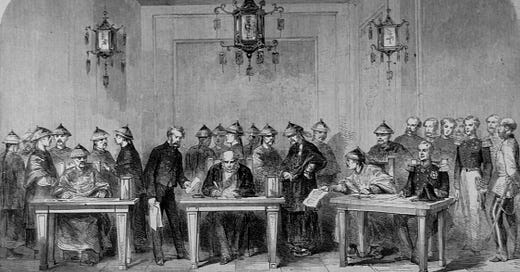Week 5: The Second Opium War and the Convention of Peking
The "Unequal Treaties" and the Concession of Kowloon Peninsula to the British Crown
Depiction of the Signing of the Treaty of Tientsin in 1858 between western diplomats and the Chinese (Source)
Where in the World?
China, during the Qing dynasty
When in the World?
Second Opium War/Second Anglo-Chinese War (1856 - 1860)
What in the World?
Last week, we discussed how the The First Opium War resulted in the concession of Hong Kong to the British.
The British wanted all of China to be open to western merchants, to legalize the opium trade, and for foreign imports to be exempt from internal tax duties. They also wanted westerners to travel and conduct business and missions freely in China. The French joined the British efforts, seeking retribution for the French missionary who had been killed by Chinese local authorities. The United States and Russia offered to send envoys to Hong Kong as military help to the British and French.
Joined by French forces, the British entered the city of Peking (Beijing today) and burned the Summer Palace in the northwestern periphery.
Who in the World?
On October 18, 1860 the Convention of Peking was held. Britain, France, Russia, and the U.S. signed the Treaty of Tientsin with the Chinese, which opened 11 more Chinese ports to Western trade. The Chinese initially refused to ratify the treaties.
The treaty outlined:
Britain, France, Russia, and the U.S. would have the right to establish embassies in Peking (a closed city at the time)
Ten more Chinese ports to be opened for foreign trade, including Niuzhuang, Tamsui, Hankou, and Nanjing
The right of all foreign vessels including commercial ships to navigate freely on the Yangtze River
The right of foreigners to travel in the internal regions of China, which had been formerly banned
China to pay an indemnity of four million taels of silver to Britain and two million to France
Kowloon Peninsula added to Hong Kong Island as a concession to the British
Why in the World?
The treaties established between Western powers and China following the Opium Wars came to be known as the “Unequal Treaties.” They gave foreigners privileged status and extracted concessions from the Chinese. The history of Western imperialism should to be kept in mind when discussing current contentions between China and the West.
Thanks for reading. Let me know if you have any feedback. I’d love to hear from you!
Stella




